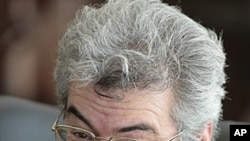A senior U.S. official says the Navy intercepted a ship suspected of carrying banned weapons technology from North Korea to Burma and forced it to return home. U.S. officials say they received support from the Association of Southeast Asian Nations, including Burma, in putting pressure on Pyongyang to halt the ship.
The USS McCampbell, a Navy destroyer, intercepted the M/V Light in international waters on May 26, as it made its way from North Korea to Burma. The ship carries the Belize flag, and authorities in Belize had given permission for it to be boarded.
But the North Korean crew refused to be boarded, and after a few days of military confrontation and diplomatic pressure, turned toward home.
Gary Samore is the White House special assistant on arms control and weapons of mass destruction. He said in Seoul Monday that the ship came under suspicion because it has been involved in weapons exports to Burma and the Middle East in the past.
Samore told VOA's Korean Service the United States did not force the issue because officials were not certain of the ship's cargo and did not want to risk a confrontation. He says North Korea insists the ship was carrying industrial chemicals to Bangladesh.
He says the United States met with its partners in the Association of Southeast Asia Nations, and "made the case" that the ship might be violating U.N. sanctions against North Korea and there were grounds for it to be inspected if it visited ASEAN ports. He said the ASEAN nations indicated their willingness to comply with the U.N. resolutions.
"The Burmese said in the meeting I was in that they would respect and honor their obligations under [U.N. Security Council Resolution] 1874. They never committed to doing inspections, but they said they would honor 1874," said Samore.
Security Council Resolution 1874 and an earlier one, 1718, bar North Korea from engaging in the arms trade. 1874 was imposed in 2009 after North Korea conducted its second nuclear-weapons test.
He also says the U.S. communicated with North Korea, through its United Nations delegation in New York, to warn them that if the ship continued its voyage, it would complicate efforts to improve relations and resume six-nation talks on ending North Korea's nuclear-weapons program. But, Samore says, there was no word on why the North Koreans turned the ship back.
Samore describes the incident as "definitely a win," in U.S. efforts to prevent North Korea from conducting illegal trade.
“To the extent that we can pressure North Korea to engage ... in negotiations over their nuclear program, we have to demonstrate to them that they are paying a penalty for refusing to engage, for violating the U.N. Security Council resolution," Samore said. "And denying them revenue from weapons sales, which is what ... 1718, 1874 does, is one of the tools that we have available. And also it is a good way to demonstrate that we have cooperation from a number of countries.”
The United States has no formal relations with North Korea, but for more than 15 years has led efforts to push the impoverished communist state to abandon its efforts to build nuclear weapons and its trade in arms technology.
In recent weeks, a U.S. team has been in North Korea to assess its need for food aid. The United Nations and other aid agencies have warned the country faces severe hunger and needs international aid this year. The United States has not yet decided on giving significant aid, although it has in past years.
North Korea has relied on international help to feed its people since a famine in the mid-1990s.
Washington also has been concerned with Burma's growing military contacts with North Korea. The two countries in recent years have resumed ties, which were severed after North Korean agents planted a bomb in Rangoon in 1983 that killed several visiting South Korean Cabinet members.
There have been numerous reports in the past two years that Burma's military aims to obtain sophisticated weaponry, including nuclear bombs. There has been no official confirmation of those reports.
The United States, like many developed nations, has imposed sanctions on Burma's leadership for human rights abuses.
US Blocks Ship Suspected of Carrying North Korean Arms




